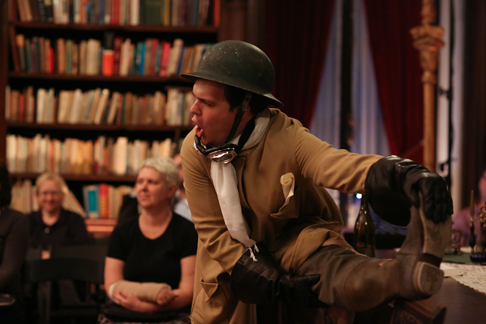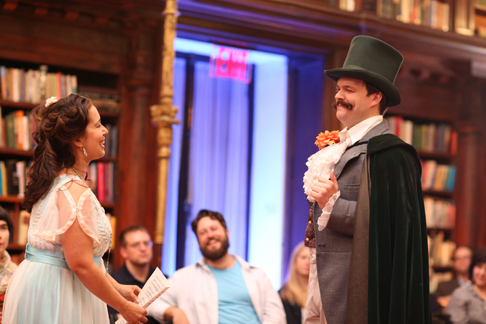![Andrew Wilkowske as Figaro and Monica Yunus as Rosina [Photo by Rebecca Fay]](http://www.operatoday.com/15-OSO-BARBER-LIBRARY.png)
15 Jun 2015
Giovanni Paisiello: Il Barbiere di Siviglia
Written in 1783, Giovanni Paisiello’s Il Barbiere di Siviglia reigned for three decades as one of Europe’s most popular operas, before being overshadowed forever by Rossini’s classic work.
English Touring Opera are delighted to announce a season of lyric monodramas to tour nationally from October to December. The season features music for solo singer and piano by Argento, Britten, Tippett and Shostakovich with a bold and inventive approach to making opera during social distancing.
This tenth of ten Live from London concerts was in fact a recorded live performance from California. It was no less enjoyable for that, and it was also uplifting to learn that this wasn’t in fact the ‘last’ LfL event that we will be able to enjoy, courtesy of VOCES8 and their fellow vocal ensembles (more below …).
Ever since Wigmore Hall announced their superb series of autumn concerts, all streamed live and available free of charge, I’d been looking forward to this song recital by Ian Bostridge and Imogen Cooper.
Although Stile Antico’s programme article for their Live from London recital introduced their selection from the many treasures of the English Renaissance in the context of the theological debates and upheavals of the Tudor and Elizabethan years, their performance was more evocative of private chamber music than of public liturgy.
Evidently, face masks don’t stifle appreciative “Bravo!”s. And, reducing audience numbers doesn’t lower the volume of such acclamations. For, the audience at Wigmore Hall gave soprano Elizabeth Llewellyn and pianist Simon Lepper a greatly deserved warm reception and hearty response following this lunchtime recital of late-Romantic song.
For this week’s Live from London vocal recital we moved from the home of VOCES8, St Anne and St Agnes in the City of London, to Kings Place, where The Sixteen - who have been associate artists at the venue for some time - presented a programme of music and words bound together by the theme of ‘reflection’.
'Such is your divine Disposation that both you excellently understand, and royally entertaine the Exercise of Musicke.’
‘And there was war in heaven: Michael and his angels fought against the dragon; and the dragon fought and his angels, And prevailed not; neither was their place found any more in heaven … that old serpent … Satan, which deceiveth the whole world: he was cast out into the earth, and his angels were cast out with him.’
There was never any doubt that the fifth of the twelve Met Stars Live in Concert broadcasts was going to be a palpably intense and vivid event, as well as a musically stunning and theatrically enervating experience.
‘Love’ was the theme for this Live from London performance by Apollo5. Given the complexity and diversity of that human emotion, and Apollo5’s reputation for versatility and diverse repertoire, ranging from Renaissance choral music to jazz, from contemporary classical works to popular song, it was no surprise that their programme spanned 500 years and several musical styles.
The Academy of St Martin in the Fields have titled their autumn series of eight concerts - which are taking place at 5pm and 7.30pm on two Saturdays each month at their home venue in Trafalgar Square, and being filmed for streaming the following Thursday - ‘re:connect’.
The London Symphony Orchestra opened their Autumn 2020 season with a homage to Oliver Knussen, who died at the age of 66 in July 2018. The programme traced a national musical lineage through the twentieth century, from Britten to Knussen, on to Mark-Anthony Turnage, and entwining the LSO and Rattle too.
With the Live from London digital vocal festival entering the second half of the series, the festival’s host, VOCES8, returned to their home at St Annes and St Agnes in the City of London to present a sequence of ‘Choral Dances’ - vocal music inspired by dance, embracing diverse genres from the Renaissance madrigal to swing jazz.
Just a few unison string wriggles from the opening of Mozart’s overture to Le nozze di Figaro are enough to make any opera-lover perch on the edge of their seat, in excited anticipation of the drama in music to come, so there could be no other curtain-raiser for this Gala Concert at the Royal Opera House, the latest instalment from ‘their House’ to ‘our houses’.
"Before the ending of the day, creator of all things, we pray that, with your accustomed mercy, you may watch over us."
The doors at The Metropolitan Opera will not open to live audiences until 2021 at the earliest, and the likelihood of normal operatic life resuming in cities around the world looks but a distant dream at present. But, while we may not be invited from our homes into the opera house for some time yet, with its free daily screenings of past productions and its pay-per-view Met Stars Live in Concert series, the Met continues to bring opera into our homes.
Music-making at this year’s Grange Festival Opera may have fallen silent in June and July, but the country house and extensive grounds of The Grange provided an ideal setting for a weekend of twelve specially conceived ‘promenade’ performances encompassing music and dance.
There’s a “slide of harmony” and “all the bones leave your body at that moment and you collapse to the floor, it’s so extraordinary.”
“Music for a while, shall all your cares beguile.”
The hum of bees rising from myriad scented blooms; gentle strains of birdsong; the cheerful chatter of picnickers beside a still lake; decorous thwacks of leather on willow; song and music floating through the warm evening air.
![Andrew Wilkowske as Figaro and Monica Yunus as Rosina [Photo by Rebecca Fay]](http://www.operatoday.com/15-OSO-BARBER-LIBRARY.png)
Written in 1783, Giovanni Paisiello’s Il Barbiere di Siviglia reigned for three decades as one of Europe’s most popular operas, before being overshadowed forever by Rossini’s classic work.
Rossini was ruthless, rippling off swaths of both Paisiello’s libretto and his music. This infuriated diehard Paisiello fans, whose cries of anger famously caused the 1816 premiere of Rossini’s opera to flop. Yet they could not keep a good work down for long. Rossini trumps his predecessor at every turn: his music has greater vitality, originality and wit, and his dramatic conception imbues the stock characters of Italian commedia dell’arte with a universal humanity that we still recognize today.
This famous history poses a psychological problem for any listener at a rare revival of Paisiello’s opera: how can one avoid keeping score? One is constantly tempted to engage in number-by-number comparison with the more famous version, which distracts from the virtues of the earlier one. After all, Paisiello’s Barbiere was famous for a reason: it is a minor masterpiece on its own terms, with simplicity of musical expression, directness of utterance and suave 18th century gentility all its own.
 David Blalock as Count Almaviva
David Blalock as Count Almaviva
A recent production at On Site Opera in New York achieved the seemingly impossible. The performance I attended on June 11th was so fresh, original and immediate that, within minutes, it banished any thought of Rossini from my mind.
Much of the success was due to the magic of in situ performance, which is the calling card of this company: its productions are set in appropriate “everyday” spaces throughout New York, where singers perform just a few feet from a small audience. This Barbiere was presented in and around the lovely Fabbri Mansion on East 95th Street, built in Italian Renaissance style. For the first scene, an audience of just 80 was seated in a small front courtyard. Figaro and Almaviva entered through a front ironwork gate, Bartolo peered out of the front door of the mansion, and Rosina sang from a second-story window. We then moved upstairs to a balconied Italianate library room that might have been in Pesaro, Parma or Seville. Throughout, there were no sets and few props, just this appropriate setting. All this seemed just right for an opera written for audiences of a few hundred gathered in small theaters, often in mansions or palaces. Though the combination of intimate surroundings, superb diction and fine acting all but dispensed with any need for supertitles, they were provided on modest HD screens.
 Monica Yunus as Rosina and David Blalock as Count Almaviva
Monica Yunus as Rosina and David Blalock as Count Almaviva
To revive a second-tier opera in an intimate setting, a company needs singing actors who are completely secure technically and credible, musically and dramatically, even with spectators just three feet away. Credit for the brilliant success of this production is thus due, above all, to the cast. Despite oppressive 90+ degree heat, they rendered this opera as fresh and immediate as it must have appeared to listeners in Paisiello’s heyday. The performers, mostly in their 30s with solid national and international successes, seemed to revel in the challenge, responding with completely credible singing and acting.
Andrew Wilkowske’s warm and full-voiced baritone was well-suited to his charismatic and characterful portrayal of Figaro. His voice sounds like it has the potential to evolve into the rarest of all things in modern opera: a great Verdi baritone. Soprano Monica Yunus made a winning Rosina. She succeeded almost entirely in warming up an essentially lyric coloratura voice to fit this more lyric role—musically and dramatically, Paisiello’s Rosina is more pensive and less forward than Rossini’s—aided by exceptionally lovely breath control and phrasing. As Almaviva, tenor David Blalock looked the part and sang competently, though he struggled at times to generate an appropriately light and warmly elegant tone, for example in Lindoro’s serenade (in the 18th century, the opera’s most famous number). Bass Rod Nelman blustered his way through Bartolo’s travails with a focused, brilliant tone, while bass-baritone Isaiah Musik-Ayala acted and sang well in the part of his buddy Basilio, paying scrupulous attention to Paisiello’s dynamics in the big aria, which are subtler than those of Rossini. Baritone Benjamin Bloomfield and Jessica Rose Futran rendered the servant’s slapstick credible, with the former deploying an extraordinarily large voice and the latter a voice noticeably smaller than those around her.
The orchestra was a slimmed down to eight and played under the inspired direction of Geoffrey McDonald. A few intonation issues aside, inevitable at that scale and with different environments, the players were skilled and energetic. The musical preparation was superb. At no moment did the flow of the music threaten to fray, despite the extraordinary challenges of conducting a group of singers often facing away from the conductor.
Overall I enjoyed this evening as much as any live opera I’ve attended in the last decade. The performance captured the spirit of the work. I was surely not alone: I looked around the room as we exited and everyone was smiling. More than that, this performance spoke to the state of opera as an art form. As larger companies like the Met, just across the park, continues to struggle with resources and relevance, smaller companies like On Site Opera are experimenting with performance in non-traditional spaces, generally at something closer to the scale at which these many works were historically meant to be heard. Perhaps they are have found a viable route back to the future.
Andrew Moravcsik